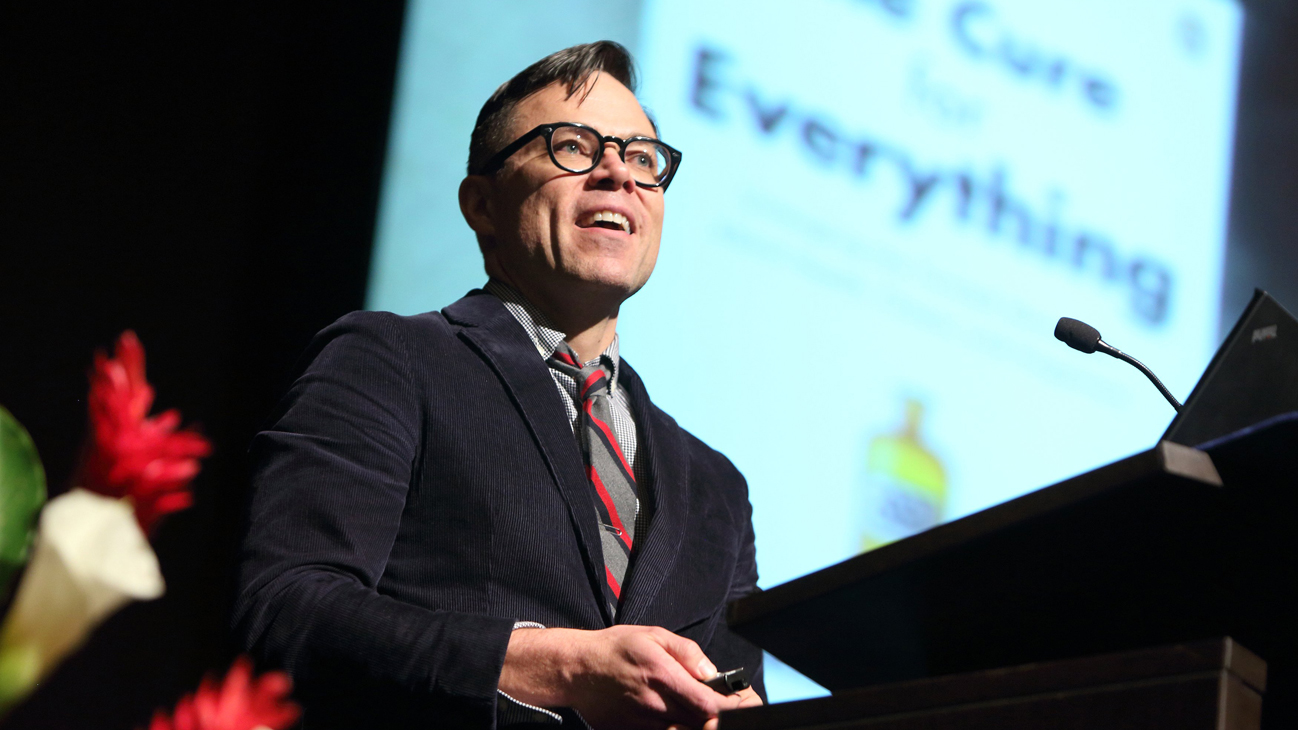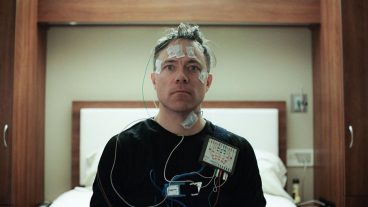The Globe and Mail profiled Professor Timothy Caulfield and his growing popularity as an unrivalled communicator who debunks myths and assumptions about alternative health care, often made popular through celebrity influence.
Caulfield is a professor of health law and science at the University of Alberta as well as the Canada Research Chair in Health Law and Policy and the Research Director of the Health Law Institute. He is also the bestselling author of Is Gwyneth Paltrow Wrong About Everything and the host of Netflix’s new show A User’s Guide to Cheating Death.
The Globe and Mail caught up with Caulfield in his office at the university to talk about his obsession with debunking “wonder cures” or “miraculous healing tonics” and his growing authority on the subject. Below is a segment of the profile, read the whole piece here.
Prof. Caulfield’s own rising career ran parallel to a mounting public distrust of science and medicine and the swelling of wellness trends, often amplified by celebrities who, with social media and sophisticated marketing, wield an unprecedented level of public influence and power.
Since Prof. Caulfield (really) likes evidence, he points out that the effect of that imbalance is not merely anecdotal. There is data to suggest celebrities are having a measurable impact on public health, whether through the anti-vaccination views promoted by Jenny McCarthy or the interventions done in pursuit of the Kardashians’ beauty standards. Ms. Paltrow’s brand Goop sells and promotes, among other things, vaginal steaming, jade eggs for women to put into their vaginas ($86) and a therapy that involves getting repeatedly stung by bees. As Prof. Caulfield points out, Katy Perry can tweet her vitamin regimen to her 107 million followers on Twitter. The World Health Organization has 4.6 million Twitter followers.
In his TV show, in speeches, and in his books and academic work, Prof. Caulfield looks at the evidence behind these health and beauty trends, examining everything from the keto diet to “vampire facials,” genetic testing services, fasting and cleanses, gluten-free eating and butt implants. He’s also examined potentially emotional topics such as stem-cell treatments and whether peanut bans in schools are effective.
Prof. Caulfield says he works to keep his own assumptions in check, researching his subjects from the opposite perspective and guarding against his own bias, remaining open to anything that can be supported by science. In some cases, such as mindfulness and “forest bathing” (spending time in a forest), the evidence surprised him – although with careful caveats. In other instances, he finds a clear difference between leaving a treatment feeling good and relaxed, and it living up to its promised benefits.
And while some therapies may be pleasant and harmless, others can be dangerous. Procedures such as colonics carry a number of risks, and doctors have raised concerns about injuries or infection that could arise from vaginal steaming and jade eggs. Actor Gerard Butler was treated twice for anaphylaxis after receiving bee-sting therapy, and another woman died after the treatment.
Many alternate therapies also come at huge financial cost, and sometimes at the expense of other medical treatment. More broadly, Prof. Caulfield believes it all contributes to the noise of misinformation, what he sees as a crisis in critical thinking around the world.
“If you are willing to believe this one magical thing, I think it’s easier to believe other magical things,” he says. “And I think this is a significant problem in this day and age: This deep erosion and loss of trust and critical thinking in how our world works.”
The amplification of celebrities such as Ms. Paltrow has amplified Prof. Caulfield as well. He does multiple media interviews a week with outlets around the world, and jade eggs and vaginal steaming come up regularly.
In some cases, elbowing his way into the celebrity wellness conversation can border on stunting. He once tried out for American Idol, knowing he was too old to be eligible. On another occasion, Prof. Caulfield got into a Twitter spat with Deepak Chopra, whom he’d called “the embodiment of pseudoscience,” a “de-educator” and “a fountain of meaningless jargon.” After Prof. Caulfield tweeted about being denied entry into a planned meeting between the two in Edmonton, Mr. Chopra called Prof. Caulfield “an insecure attention seeker” and accused him of wanting media attention. (Mr. Chopra later apologized and blamed a misunderstanding with hotel security.)
Prof. Caulfield, however, makes no apologies for using the platform of people such as Mr. Chopra or Ms. Paltrow for his own purpose, which he describes as pitting “creative communication strategy against creative communication strategy.”
“It’s almost a little bit of a Trojan horse,” he says. “To be honest, the Gwyneth book is a Trojan horse to talk about these issues. There’s that element too, to kind of use celebrity culture against itself.”
Growing interest in these issues has made Prof. Caulfield a busy man. At one point this fall, his schedule included speaking at a skeptics’ convention in Las Vegas, appearing on a panel between Apple chief executive Tim Cook and Facebook’s Mark Zuckerberg in Brussels, a media tour in Toronto, and then an event in Morden, Man.
At the same time, he’s writing a new book and working at the university, where his team has research papers rolling out every few weeks. He says he hopes to do a third season of his TV show, and continue with other TV projects.
In an atmosphere where even long-disproven theories – such as the Earth being flat – have seen a resurgence, and the marketing of pseudoscience and unproven therapies grows ever more complex, Prof. Caulfield’s battle can feel vast and unwinnable. But with the exception of some sleepless nights, he seems to take the scope in stride. He says he considers it to be almost like fighting smoking: a broad campaign that will make gains over time.
“It’s not going to be one policy or one tactic that’s going to help moderate this problem,” he says. “You have to use all of these tools, and we’re probably not ever going to totally eradicate it, but we can make things a little bit better.”
Interested in learning more about Timothy Caulfield and what he can bring to your next event? Email us at [email protected].




